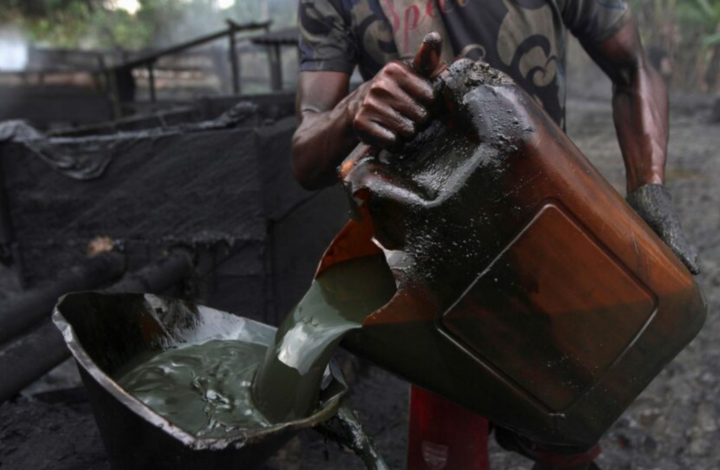Nigeria’s oil sector has achieved a significant milestone as recent data indicates that crude oil theft has dropped to its lowest level since 2009. This development comes as a major relief for Africa’s largest crude producer, which has long grappled with the twin challenges of oil theft and pipeline vandalism that have undermined production, revenues, and investor confidence.
According to monitoring reports from industry regulators and security agencies, the volume of crude stolen from pipelines and other facilities in the Niger Delta has seen a sharp decline over the past few months. Officials attribute this progress to a combination of stepped-up security operations, community partnerships, technological surveillance, and stronger collaboration with host communities.

The Nigerian National Petroleum Company Limited (NNPC Ltd) noted that crude losses, which once averaged over 400,000 barrels per day at their peak, have now fallen to a fraction of that figure, marking the lowest level in more than 15 years. This drop is seen as a major boost to government revenues at a time when fiscal pressures remain high, and oil earnings are needed to stabilize the economy.
Industry experts credit the turnaround to an aggressive clampdown on illegal bunkering activities, coordinated by security forces in partnership with local vigilante groups. Over the past year, several illegal refining camps and makeshift pipeline tapping points have been destroyed, while arrests and prosecutions of suspects have also been stepped up.
In addition, the government’s decision to contract pipeline surveillance to private firms with deep local knowledge—most notably firms owned by community stakeholders—has paid off. These firms have been able to use their networks in oil-bearing regions to monitor pipelines, deter vandals, and provide real-time intelligence to authorities.
Another contributing factor has been the deployment of technology, including drones, satellite imagery, and advanced monitoring systems, which have improved detection of leaks and unauthorized tapping. This has not only reduced theft but also minimized the environmental damage caused by oil spills.
For Nigeria, where crude oil accounts for the majority of foreign exchange earnings and a significant portion of government revenue, the sharp decline in theft is expected to translate into improved fiscal stability. With oil production now stabilizing around levels not seen since the theft crisis worsened in recent years, the country is better positioned to meet its OPEC production quota and benefit from global oil prices.
Stakeholders, however, caution that the battle is far from over. The Niger Delta region, where oil facilities are concentrated, remains volatile, and illegal refining remains a source of livelihood for some communities struggling with poverty and unemployment. Experts warn that unless underlying socio-economic issues are addressed, there is a risk that theft could resurface if security vigilance drops.
The federal government has promised to build on the recent success by strengthening collaboration with oil companies, host communities, and international partners. Officials said a holistic approach is needed—one that combines security, socio-economic development, and environmental restoration.
Environmentalists have also welcomed the decline, pointing out that crude theft and illegal refining have been major contributors to oil spills and pollution in the Niger Delta. Reduced theft means fewer ruptured pipelines and less crude dumped into rivers and farmlands, which should gradually reduce environmental damage if the trend is sustained.
Oil companies operating in Nigeria have expressed cautious optimism. In recent years, major producers including Shell, Chevron, and TotalEnergies have scaled back investment in onshore operations due to the scale of theft and sabotage. The sharp reduction, if sustained, could help restore confidence and attract new investment in Nigeria’s oil sector, particularly in onshore and shallow water fields.
The development also comes at a crucial time for Nigeria’s broader economic reforms. With the removal of fuel subsidies and efforts to stabilize the naira, higher oil revenues could provide fiscal relief and support ongoing government initiatives in infrastructure, social spending, and debt management.
Market analysts note that global oil traders are also watching Nigeria’s progress closely. A sustained reduction in theft will improve Nigeria’s export reliability and strengthen its reputation in the international crude market, where disruptions from theft and vandalism have in the past dented the country’s credibility.
Despite the optimism, civil society groups are urging the government to ensure transparency in reporting crude production and theft levels. They argue that past administrations often underreported theft figures or failed to account for recovered crude, leading to revenue leakages. Transparency, they say, will be critical to sustaining public trust and ensuring that gains from reduced theft translate into real economic benefits for Nigerians.
For now, Nigeria’s oil sector appears to have turned a corner in a crisis that has drained billions of dollars in revenue over the past decade. The government, security agencies, and oil firms alike see the sharp decline in theft as a chance to reset the narrative around Nigeria’s petroleum industry. But whether the success can be sustained will depend on vigilance, continued investment in security and technology, and addressing the root causes of theft in oil-bearing communities.
As one industry expert observed, “This is the first time in over a decade that we can say crude oil theft is no longer at catastrophic levels. The challenge now is to ensure this victory is not temporary but becomes the foundation for a new era in Nigeria’s oil industry.”
Support InfoStride News' Credible Journalism: Only credible journalism can guarantee a fair, accountable and transparent society, including democracy and government. It involves a lot of efforts and money. We need your support. Click here to Donate
